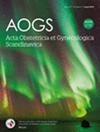Long-term gastrointestinal function outcomes of women undergoing nerve-vessel sparing segmental or full-thickness discoid resection for deep colorectal endometriosis
Abstract
Introduction
Patients undergoing colorectal surgery for symptomatic deep endometriosis may experience postoperative impairment of gastrointestinal function. However, there is limited information on long-term follow-up of this surgical sequela. We aimed to analyze 5-year postsurgical outcomes of gastrointestinal function in these patients, reflected by lower anterior resection syndrome (LARS) scores and gastrointestinal quality of life index (GIQLI).
Material and Methods
This prospective study included patients who either underwent nerve-vessel-sparing segmental resection (NVSSR) or full-thickness discoid resection (FTDR) for symptomatic colorectal deep endometriosis from April 2017 to May 2022 at two tertiary referral centers. As published previously, gastrointestinal function was evaluated by LARS and GIQLI scores pre- and postsurgically (postoperative visit 1) and was now re-evaluated (postoperative visit 2) to gain information on long-term outcomes.
Results
Out of 121 patients, 92 were eligible for the final analysis at postoperative visit 2. The mean follow-up interval was 58.5 ± 17.9 months in the NVSSR group and 61.6 ± 10.7 months in the FTDR group. As published previously, presurgical LARS-like symptoms were observed in 42/92 (45.7%) of patients, including 37/76 (48.7%) in the NVSSR group and 5/16 (31.3%) in the FTDR group. Compared to preoperative LARS scores, patients in the NVSSR group showed a significant reduction of LARS scores at long-term postoperative visit 2 (p = <0.001), with LARS scores remaining stable over postoperative visit 1 and visit 2 (p = 0.09) at 5 years postoperatively. In women following FTDR, presurgical and long-term postoperative visit 2 LARS scores remained statistically unchanged (p < 0.73), with worsening of LARS scores between postoperative visit 1 and visit 2 (p = 0.02). In contrast, significant improvement of GIQLI was observed between the preoperative visit and postoperative visit 2 at 5 years follow-up in both NVSSR and FTDR groups (p ≤ 0.001 and p = 0.001, respectively).
Conclusions
Compared to presurgical values, long-term gastrointestinal function reflected by LARS scores remains improved following NVSSR, whereas it remains unchanged following FTDR. However, when GIQLI is applied as patient-reported outcome measurement (PROM), patients show permanent, long-term improvement of gastrointestinal function following either NVSSR or FTDR for symptomatic colorectal endometriosis.




 求助内容:
求助内容: 应助结果提醒方式:
应助结果提醒方式:


